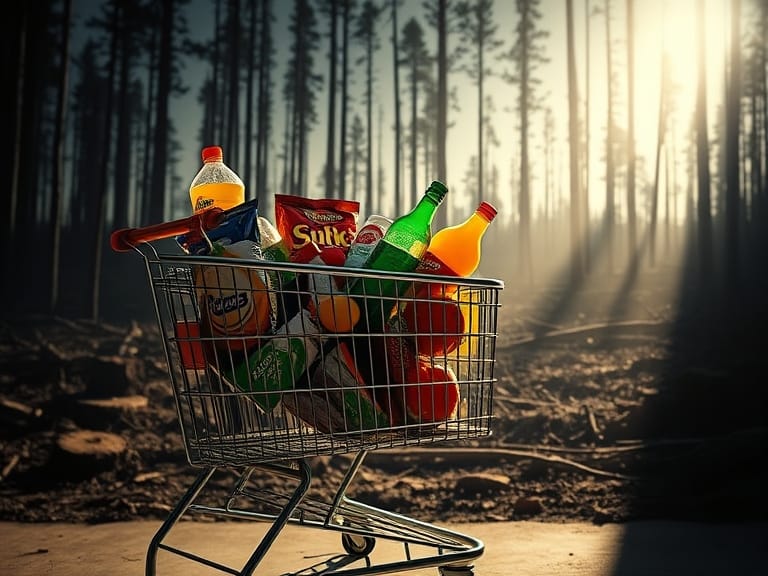
You’re strolling through the aisles of your favorite supermarket, tossing products into your cart — bread, snacks, a jar of peanut butter, maybe some chocolate. You’re feeling good about your choices, but lurking behind those innocent packages could be a darker story.
What if I told you that your weekly grocery haul might be a silent contributor to one of the planet’s most pressing environmental crises: deforestation?
Yup, the lush rainforests, home to orangutans, jaguars, and countless other species, might be paying the price for your favorite treats. Let’s dig into how this happens and, more importantly, how you can stop being an unintentional accomplice to environmental destruction.
The Hidden Villains in Your Pantry
You know that saying, “Don’t judge a book by its cover?” Well, it applies to food packaging too. Behind glossy labels and claims of “natural” or “eco-friendly,” many products are made with ingredients linked to deforestation.
Take palm oil, for instance.
Found in everything from cookies to shampoo, palm oil is the number-one culprit of tropical deforestation. Vast swaths of rainforest in places like Indonesia (yep, my home turf!) and Malaysia are cleared to make way for palm oil plantations.
The result? Displaced wildlife, carbon emissions, and local communities pushed to the brink.
And it doesn’t stop there.
Soy (a staple in animal feed), beef, and cocoa are also major contributors. These industries often slash and burn forests to create farmland, releasing massive amounts of greenhouse gases. Worse, this destruction threatens indigenous communities whose livelihoods depend on the forests.
Why Should You Care?
You might think, “Well, the planet’s problems aren’t mine to fix,” but here’s the thing: deforestation impacts you directly.
Let’s break it down:
- Climate Change Hits Hard: Forests act like Earth’s air purifiers, soaking up CO₂ and breathing out oxygen. When trees are cut down, that CO₂ is released back into the atmosphere, turbocharging global warming. Rising sea levels, extreme weather, and even our food security are at stake.
- Biodiversity Loss is Our Loss: Every time a forest falls, we lose species — some of which might hold the cure for diseases or play critical roles in ecosystems. It’s not just sad; it’s downright dangerous.
- Social Impact: Many of the products tied to deforestation are made by exploiting marginalized communities. Buying these products unknowingly supports industries that undervalue human lives.
The Wake-Up Call
So, what’s a conscious shopper to do? Should you swear off chocolate or live without peanut butter? Relax, no one’s asking for miracles. Small, informed changes can make a world of difference.
- Read Labels Like a Detective
Palm oil is often sneakily listed under other names (like “vegetable oil” or “glyceryl”). Look for certifications like RSPO (Roundtable on Sustainable Palm Oil) or Fairtrade labels to ensure ethical sourcing. - Support Local and Sustainable Brands
In Indonesia, we have a saying: “Berat sama dipikul, ringan sama dijinjing” (loosely, “Shared burdens are easier to bear”). Support brands that value sustainability and local farmers. These businesses often produce goods without sacrificing the planet. - Go Plant-Based Where You Can
Meat, particularly beef, is a heavyweight in deforestation. Cutting back on meat — even a few times a week — can significantly reduce your impact. Plus, who doesn’t love a hearty veggie stir-fry? - Speak with Your Wallet
Big companies pay attention to consumer demand. Every time you opt for a sustainable product, you’re sending a message louder than any protest chant: “We care about the planet!”
Let’s Talk Solutions
It’s easy to feel overwhelmed by the enormity of the problem. But here’s a comforting thought: you don’t have to do it all. Even a tiny shift in your habits — switching to sustainably-sourced chocolate or reducing meat consumption — can ripple outward in ways you can’t even imagine.
Think of it like planting a tree. You won’t see a towering oak overnight, but years later, there’ll be shade for everyone. The same goes for your grocery choices.
So, next time you’re in the grocery aisle, remember this: your choices matter. The world doesn’t change because of big, dramatic gestures — it changes when millions of people make tiny, intentional decisions every day.
Let’s turn your cart into a force for good.
And while you’re at it, why not inspire a friend to do the same? The forests, the animals, and yes, even your future self will thank you.









